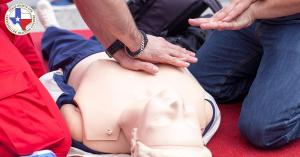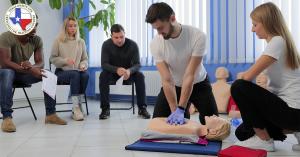Group CPR Training for Employees Becomes Standard in Dallas
Dallas businesses adopt group CPR training to boost workplace safety, compliance, and employee confidence while preparing staff for emergencies.
DALLAS, TX, UNITED STATES, October 1, 2025 /EINPresswire.com/ -- Dallas-based companies are increasingly adopting group CPR training for employees as part of their workplace safety standards. Employers across industries have recognized the importance of preparing staff to respond effectively in medical emergencies. This approach ensures a safer environment for workers, clients, and visitors while aligning with compliance requirements and risk management strategies.CPR training has long been viewed as essential for medical professionals and first responders. However, its implementation across corporate offices, industrial sites, retail businesses, and community organizations highlights a shift toward broader emergency preparedness. With growing awareness of cardiac emergencies in the workplace, the practice of organizing structured CPR training sessions for employees has now become a standard measure across Dallas.
Why Group CPR Training is Essential for Dallas Workplaces
Cardiac arrest can occur without warning and often requires immediate response. Statistics from national health organizations show that survival rates increase significantly when CPR is administered promptly before professional medical help arrives.
According to the American Heart Association (AHA), more than 350,000 out-of-hospital cardiac arrests occur in the United States each year, and about 70% of these happen at home or in public places where bystanders are first to respond.
The AHA also reports that the chance of survival from cardiac arrest can double or triple if CPR is performed immediately.
Group training offers specific benefits for organizations in Dallas:
a. Consistency in Training: All employees receive the same instruction, ensuring uniform knowledge across departments.
b. Hands-On Experience: Group settings allow for practical demonstrations and supervised practice using mannequins and training equipment.
c. Team-Oriented Preparedness: Employees learn to work together in simulated emergency scenarios, improving coordination during real-life incidents.
d. Convenience and Efficiency: Onsite training sessions minimize disruptions to daily operations while covering a large number of participants at once.
By embedding CPR readiness into workplace culture, Dallas businesses are creating safer environments for their employees and communities.
Integration of CPR Training into Workplace Safety Programs
Companies in Dallas are weaving CPR instruction into their broader occupational health and safety programs. Human resource departments and safety officers often coordinate with certified trainers to design tailored sessions that match the unique needs of the organization.
For example, offices with large staff populations may request multiple sessions across different shifts. Industrial facilities may focus on scenarios involving equipment-related risks. Retail locations and customer-facing organizations may emphasize CPR response in crowded environments. This adaptability makes group training an effective solution across sectors.
Moreover, many Dallas employers are incorporating CPR certification into onboarding requirements and periodic training schedules. Employees receive certification cards upon completion, which typically remain valid for two years. This structured approach ensures ongoing preparedness and compliance with safety standards.
Training Standards and Certification
Group CPR training for employees in Dallas follows nationally recognized guidelines established by organizations such as the American Heart Association (AHA) and the American Red Cross. Certified instructors provide step-by-step instruction on:
a. Recognizing cardiac arrest symptoms.
b. Performing chest compressions and rescue breaths.
c. Using automated external defibrillators (AEDs).
d. Managing choking emergencies.
Participants are assessed through hands-on practice and testing to ensure competency. Successful participants receive certification valid for a designated period, reinforcing the organization’s readiness for emergencies.
Data from the Occupational Safety and Health Administration (OSHA) indicates that 10,000 sudden cardiac arrests occur annually in U.S. workplaces, underscoring the need for CPR and AED training as part of corporate safety initiatives.
Impact on Employee Confidence and Workplace Culture
Beyond compliance and safety, group CPR training contributes to employee confidence. Workers who complete the program often feel more prepared to handle emergencies not only in the workplace but also in community or home settings.
The training encourages a culture of collective responsibility. In Dallas, where businesses range from small enterprises to large corporations, this shared readiness fosters a stronger sense of teamwork and mutual support.
AHA surveys show that only about 46% of people who experience an out-of-hospital cardiac arrest receive CPR from bystanders, revealing a gap that workplace training can help bridge.
While the impact of CPR training on long-term health outcomes is a subject of ongoing study, its role in immediate emergency intervention is widely acknowledged.
Adoption Across Dallas Businesses
The adoption of group CPR training for employees in Dallas has extended beyond corporate offices. Educational institutions, warehouses, gyms, childcare centers, and public service organizations are among the many sectors participating. This broad integration reflects the universal relevance of CPR training.
Workplace policies are also being updated to reflect the new standard. Many companies now list CPR certification as a preferred qualification in job postings. Others encourage voluntary participation, while still organizing company-wide sessions to ensure broad coverage.
This growing emphasis signals a lasting change in how Dallas businesses approach emergency preparedness.
Legal and Regulatory Considerations
While no federal law mandates CPR certification for all employees, certain industries require it under occupational safety regulations. For example, childcare centers and healthcare facilities often must comply with CPR training requirements. However, Dallas businesses in other sectors are voluntarily extending these standards to general staff, recognizing the broader benefits of readiness.
Employers are careful to work with certified trainers to ensure the program aligns with both legal standards and best practices. Training organizations typically maintain compliance with national guidelines, ensuring instruction meets recognized quality benchmarks.
Accessibility and Customization of Group Training
Dallas employers benefit from the flexibility of group CPR programs. Training providers offer on-site sessions, allowing employees to learn in familiar environments. Class sizes can be customized, and schedules arranged to accommodate business operations.
Many companies opt for blended training models, combining online modules with in-person practical sessions. This hybrid approach enables employees to complete theoretical learning at their own pace before practicing techniques under supervision.
By making CPR training accessible and adaptable, organizations reduce barriers to participation and maintain workforce readiness.
Long-Term Benefits for Dallas Employers
The decision to implement group CPR training in Dallas workplaces provides long-term advantages:
a. Risk Management: Prepared employees reduce liability risks and potential workplace losses.
b. Employee Well-Being: Staff feel supported in a culture that values safety and health.
c. Community Safety: Skills gained in training can be applied outside the workplace, strengthening community resilience.
d. Reputation and Trust: Businesses known for prioritizing safety often attract and retain employees more effectively.
The AHA estimates that immediate CPR could prevent nearly 200,000 deaths annually in the United States, emphasizing the long-term societal benefits of broad adoption.
These benefits contribute to a sustainable model of workplace health and safety.
About Texas OnSite CPR
Texas OnSite CPR is a training provider specializing in cardiopulmonary resuscitation (CPR), automated external defibrillator (AED), and first aid courses. Based in Texas, the organization offers on-site group training sessions tailored to the needs of workplaces, schools, and community organizations. All programs follow nationally recognized guidelines and are led by certified instructors.
The company emphasizes accessibility, offering flexible scheduling and adaptable class sizes to meet the requirements of diverse organizations. Texas OnSite CPR provides certification upon course completion, ensuring that participants meet established competency standards.
Tom McMillan
Texas Onsite CPR
+1 (817) 992-0585
cprtom@mac.com
Visit us on social media:
Facebook
Legal Disclaimer:
EIN Presswire provides this news content "as is" without warranty of any kind. We do not accept any responsibility or liability for the accuracy, content, images, videos, licenses, completeness, legality, or reliability of the information contained in this article. If you have any complaints or copyright issues related to this article, kindly contact the author above.




